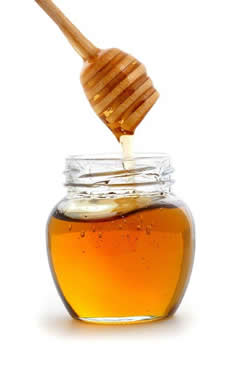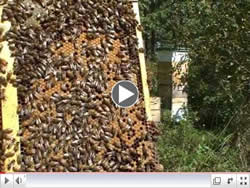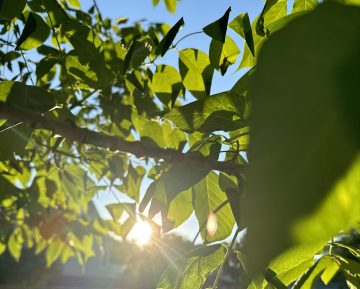
The story of my honeydew crop: Not deterred by the rare drought conditions that year which quickly dried up flower sources of sweet nectar, the resourceful honeybees found an alternative source! The honeybees found sugary secretions from aphids who were numerous in the aspens and poplars. So this honey is not flower nectar at all, but rather double-processed tree sap: once by aphids and then again by bees! Usually aphids are “farmed” protectively by ants, but in this case, bees slip past the guards and “steal” the precious product! This is in stark contrast to the story of pollination, where honeybees serve flowers and get “paid” with nectar and pollen.
Honey is one of the earliest folk medicines in human civilization. It has been used in numerous traditional remedies since ancient times to treat wounds, burns, skin conditions, infections, indigestion, low energy, insomnia, sore throats, coughs and more!
Honeydew is highly prized in Europe for its unique medicinal properties. Concentrated, dark-coloured, natural antioxidants from tree sap provide protection to body tissues. The active bee and aphid enzymes provide antibacterial and anti-inflammatory properties that facilitate wound and burn healing when applied directly to the wound under a gauze dressing.
Science reveals the mechanisms of honey’s antibacterial power:
- Osmotic and acidity effects
- Hydrogen peroxide-generating enzyme system (heat sensitive: so don’t heat your honey!) activates with exposure to wound tissues
- Antioxidants and other antibacterial phytochemicals in darker honeys like honeydew
- A nourishing capacity for immune cells at the wound
- Mechanically protective of new tissue at the wound
The active enzymes which have been preserved through gentle processing enable the honeydew to mature and ripen with time like a fine wine.
The exceptionally low moisture of this product (14% as opposed to the 17% rating of Canada #1 standard) means that it will not spoil. No refrigeration is necessary; just keep the lid on tight so moisture from the air doesn’t get in.
Whether for health benefits or for savouring a taste of summer on a special winter occasion, indulge your senses and delight in a gift from Nature: sunlight transmuted by tree, aphid and bee!
I still have a little of this honey, which I give away for charity auctions, and have for sale in little jars at the clinic as a medicinal.





